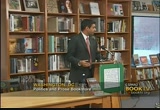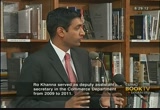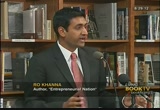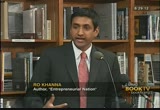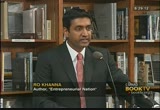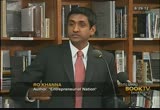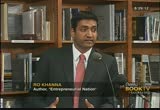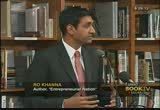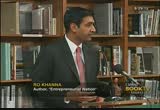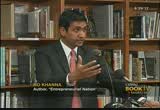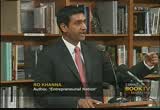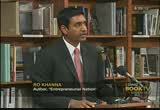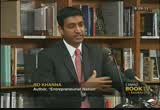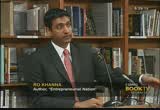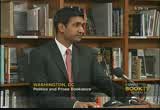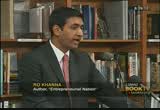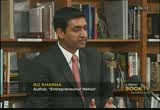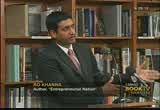tv Book TV CSPAN September 9, 2012 8:00pm-9:00pm EDT
8:00 pm
america. we are going to change that. >> well, thank you. >> you are watching booktv on c-span2. forty-eight hours of nonfiction authors and books every weekend. >> here's a look at some books that are being posted this week on 10 actor tony danza recounts the year that he spent teaching english at philadelphia's largest high school. jeff cohen and john chase report on how former illinois governor rod loogootee ridge misused the word governor, in their book, golden. then a first-hand account of the first female class action lawsuit against his former employer, newsweek.
8:01 pm
8:02 pm
and watch for the authors in the near future on book tv and booktv.org. next on book tv, ro khana secretary of commerce argues that the u.s. is and will continue to be a leader in manufacturing and innovation. it's about 45 minutes. [applause] >> thank you for that kind introduction. it is an honor to be at politics and prose, such an institution to the city and really a pleasure to be here. thank you for everyone coming out on this august evening to hear me. i will try to be brief in my comments, and i rather have more of an exchange of ideas and hear your perspective so that we can have a conversation about manufacturing and what our country should do to become competitive. the idea for the book came about
8:03 pm
when i was traveling around the country. i would go and see a successful manufacturer making lenders, making steel, making fire suits making meat and food, and i would say you know, i thought all of our manufacturing had gone offshore. something doesn't make sense. and so i started to wonder what were people missing in the story if. and it turns out that one allele of consumer manufacturing has gone offshore so if you go into a store, but always, the apparel, a lot of that has left america we are still a world leader when it comes to complex advanced manufacturing. we need almost 80% of our steel. we make a tremendous amount of planes coming and we are neck-and-neck with manufacturing
8:04 pm
with china. now that is a staggering statistics. we make 20% of the world's goods with about 10% of our economy. and china makes about 20% of the world's goods with 40% of its economy. so, we are neck-and-neck as a manufacturer, and it is to to the sixth time productivity advantage that we enjoy over china when it comes to manufacturing and we have a productivity advantage over the countries like japan and germany, countries which are thought of as manufacturing leaders. so, i want -- wonder what gives us this productivity advantage, what gives american manufacturers this ability to compete in? and i wanted to go and talk to real manufacturers, because one of the things when you are in
8:05 pm
washington and in these bureaucracies you have a lot of people pontificating about the state of american manufacturing and what we need to without actually engaging and talking to the manufacturers, and particularly not talking to the small and medium-sized manufacturers. the large manufacturers, the ceos are often represented on the policy think tanks, but the reality is that almost half of our manufacturing jobs are with small and medium-sized businesses. so, i decided that i wanted to talk to some of these small and medium-sized businesses and figure out what it was the was giving them a comparative advantage. one of the arguments i made in the book is that it is a more entrepreneurial culture that allows us to have a productivity advantage. and by that, i don't mean simply the entrepreneur at the top of steve jobs or mark zuckerberg great industrialist. what i mean is that companies that do well in the
8:06 pm
manufacturing space actually listen to the idea is of their employees and our encouraging their employees to come up with the efficiencies and production to figure out how to assemble things more efficiently or make products that are more innovative, and they are soliciting those ideas. and here is where i think a lot of the traditional critique on the manufacturing misses the mark. robert reich, who makes the argument that there is knowledge work -- people like lawyers, my profession, and doctors and bankers are knowledge workers, and sort of and is the manufacturers. and he completely missed the idea of modern manufacturing. modern manufacturing requires a lot of knowledge. these are people who are thinkers, who are innovative. and lawyers i can tell you require a lot of competitive work. some lawyer would say we draft documents of the standard template and then it is repetitive, so there is a distinction that is artificial,
8:07 pm
and the best in the factors that i met were really listening to the ideas. let me give you to concrete examples. i talk about about 15 of them in the book. one is vitamix blunders to be a i was shocked to learn of the blunders that meet your pacino, i drank a lot from pacino's -- frappucinos. most are made in the united states. i realized why i am paying $4 for my frappucino. why is it that you are allowed to -- your able to make lenders in the united states and sell them to these specialty coffee shops. jody explained that the specialty coffee shops have very specified requirements for what they want out of their blunders. one, they don't want any moraes.
8:08 pm
why? let's say you go to barnes and noble, and i do go to the chain stores still, if you go to starbucks and the blender is making noise you are not going dillinger and going to the store. so, they want to make sure that there is absolutely no noise in the blender. second, for those of you that enjoy frappucinos you know you don't want those ice chips in there so they want to make sure that they actually crushed the ice chips properly. so, what jody was able to do is to actually work with these specialty coffee shops on the design of the blender that they want to come and that is a very difficult process to outsource. you can imagine if you were in china or brazil trying to figure out how to design something with a customer and interacting with them would be very complicated. so the customization of products that a lot of small and medium-sized manufacturing deutsch is inherently impossible
8:09 pm
to do in the united states. wasn't just jody that was engaged in a spitting it was her employees who were coming up with ideas on what to do to make the blender better. issing said example is global manufacturing. this was one of the most inspiring stories in the book. it is a manufacturer existing since 1887 and they make fire suits. after 9/11 when the pentagon was attacked and they needed fire companies to put out the fire, they had different companies come from the virginia area and the d.c. area and they noticed that only the companies that were wearing these fire suits were able to work through the night and deal with the pathogens and extremities that were in the pentagon building. so, one of the people, the commanders and the pentagon called up rot -- rod friese and
8:10 pm
said we need 300 fire suits tomorrow. he says what's the size? i don't know, just find out how to get them there. so, rod friese, in this small company of new hampshire -- about 300 people -- assembled these fire suits. rod friese was the only one was able to take a mercy flight after 9/11, the only one in the air space, delivered these fire suits and they used them to put out the fire in the pentagon. so it is a story about patriotism, but it's more than that. i wanted to know well, what is it that allows the fire suits to still has these comparative advantages. in one of the biggest insights for global fire suits came in a production efficiency. they are able to make fire suits much cheaper than a lot of foreign competitors. the idea -- which i go into detail in the book -- came from one of the and we is on the assembly line who said if you use a smaller size needle than a
8:11 pm
larger size needle, you are actually going to make smaller holes, and it's going to save fabric and that will save the cost. this was an idea that was submitted in a suggestion box for the manufacturing that led to a lot of the innovation. and again, it showed this sort of culture of listening to the globe's employees. the second part of the globe that is unique is the way they would in of a the sensors and the tide of equipment on the fire suits that help fight extremities didn't come from ph.d. scientists. in fact the guide was doing a lot of the tinkering didn't even have a college degree. succumb often there is the sense of well, we need them education, and absolutely think we do. but we shouldn't underestimate the sense of practical skills that are often passed down from generations so people acquire to actually doing things on the
8:12 pm
factory floor that account for a lot of globe's most successful innovation when it comes to fire suits. one of the thesis that i said is our space culture in the business world gives us this competitive advantage over the more authoritarian manufacturing structures particularly smaller and medium-sized businesses because it allows them to economize production and allows them to customize products. the second thesis in the book is tracing a support of manufacturing back in american history, and the idea that there has always been a role for government support of private industry going all the way back to alexander hamilton. i tell people you don't have to reva "the world is flat" to understand what we need to do in a globally competitive world.
8:13 pm
you can read alexander hamilton's report on manufacturing, ten pages, and he makes almost the identical arguments. hamilton says in a world where we are competitive with other nations and other nations are sitting of industries, we need to make sure that we have fair trade. we need to make sure that we are providing incentives, economic incentives for new industries. substitute plan technology you could almost get the justification for the funding through hamilton's arguments. hamilton makes the argument we need infrastructure and roads to support manufacturers. he makes the argument that we need to write tax incentives and that we needed the right of work force that is educated. and even jefferson, people say jefferson was on the other side but jefferson comes around to the view that the government needs to support manufacturing. now, this becomes the american economic system and influences
8:14 pm
henry clay, influences abraham lincoln, and is the governing philosophy of america's rise in industrialization. in her work hoover, when i got to the commerce department i wondered why would you name the commerce building after the president responsible for the depression, not to betray my partisan leanings, but i developed a lot of respect for her but hoover. herbert hoover we have not been the best president, but he was a great commerce secretary. they called him the secretary of commerce and undersecretary of everything else. he was working for calvin coolidge, you know what he did? he believed in the urban american system coming and he had calvin coolidge, the great apostle of the limited government poured in billions of dollars to separate the aviation industry. so the help which is now still in wichita kansas, funding the existence of the infrastructure. and calvin coolidge, which i quote in the book talks about
8:15 pm
the importance of the investment in roads, and you have eisenhower of course with the highways and even ronald reagan invested in the semiconductor industry, and the manufacturing partnership which now some people think is irrelevant or bureaucratic was actually the grandchild of the rating. so what has happened? in the last 30 years there has been this sense that the government should no longer matter among some of the people with certain ideologies. and they argue that america should not make the mistake of becoming like your. the irony of course is to the site for their philosophy, the great american thinkers like von hayek and ayn rand. the intellectual justification for the free market absolutism
8:16 pm
is not found in american history because alexander hamilton said well, he believed in free market, practical politicians need to realize that there are times to intervene, and we have been an asian mind comes to manufacturing that has rejected the ideologies of both the left and the right and has really done what works and that is through the book i try to advance the argument coming and i think that person who sums up the best is columnist richard macgregor from the financial times, and he has a brilliant quote where he says america's problem is not that it does not work like china. america's problem is that it no longer works like america. and i think what he means by that is we don't need to copy a system of government in china or
8:17 pm
brazil that has excess of state intervention. but we do need to remember what policies helped make us an industrial power, and those policies hopefully can be adopted on a bipartisan basis like they were until our most recent history and most recent turn to what i would say is free-market absolutist. i think there is a practical middle ground. the question then -- and we can get into some of the policy in the q&a, the question that often comes up is what is the hope for the future? what is this sense of american manufacturing, america's economy with the rise of china or the rise of brazil or the rise of other developing nations. one of the points i make is our nation has consistently been underestimated when it comes to
quote
8:18 pm
our
8:19 pm
the
8:20 pm
great britain. things didn't work out well for them afterwards. so, we are faced with a challenge, and the challenge is not for the american entrepreneurs and manufacturers of ford, the challenges are they going to get on a bipartisan basis support of their government that has existed for the 200 year tradition. the argument i am making is we need to come together on a nation as the national security basis and on a sense of our economic competitiveness to put together a manufacturing agenda that is going to help the small and medium-size manufacturers make ends meet and continue to thrive in an environment where they are not getting the assistance of their government, and other foreign competitors are getting extraordinary assistance from their governments. let me end on the note that i think i am the most optimistic about, and i don't talk about this fully in the book but
8:21 pm
coming from silicon valley you see the existence of the technology companies and the technology advantage still the case that twitter and facebook and all these companies are emerging in the united states and the technology of the united states represents the ability to not just export and export our products and technology, but to export our ideals of space dialogue, the free flow of information coming into the devotee of these technology companies which are still based in the united states to have a global impact i think bodes well not just for our economic future but also the ability of america to continue to project its ideals across the world to flee democratize the flow of information which i argue is
8:22 pm
fundamental to much of our productivity in the comparative advantage. thank you and with that i would be happy to answer your questions. [applause] >> yes, this is life. i wanted to ask a little bit about what you foresee in the future of manufacturing has manufacturing itself changes. i anderson and there may be less assembly lines and more widespread one of foot computer aided manufacturing and how our entrepreneurial advantage continue to preserve your in that environment? thank you. >> that is an excellent question. >> what would the role of technology be for american minister to read the first thing i caution people not as i don't think technology is going to replace workers, fully replace
8:23 pm
workers. john maynard keynes had a famous article in the 1930's where he said technology is progressing at such a great rate that in 20 years we are we to be working 15 hour work weeks. now that turned out to be completely false because what happened, what i think he did not account for is the demand for drugs would increase. who would have bought back in the 1930's anyone would ever need an iphone? weigel automation reduced the need of workers on particular goods, the output had raised so much that we are able to have more of a need for the workers. with that said, i think what technology enables when we have things like the additive printing and robotics is the ability to continue to have a productive to the advantage and efficiency advantage over our other competitors. and the challenge in my judgment
8:24 pm
for the united states work force is how are we going to prepare people to be able to use these machines to be able to operate the machines, to be able to converse and with computers and technology that's why i think the investment in the technology in the internet and and training people on that is absolutely critical to our future and the education and specific types of education. it's not diminishing the skill devotees jobs require. some of my law school classmates are here and they will tell you i was completely inept at making anything and probably ironic that i read the book a manufacturing. but i can go right a brief. i can't go assemble a machine.
8:25 pm
it doesn't mean that it's difficult and it's not any better. it may have its own market value. but somehow we have frowned upon or we don't appreciate the complexity of the skills required in the trades, and i think we need to put it to keep our technology and also have a respect for how difficult some of these jobs are. you just mentioned the importance of sustaining our efforts of technology oriented education. which of our other current manufacturing facilities an initiative do you think are critical for us to sustain them and what new initiatives would you suggest in order to continue to stimulate our entrepreneurial success? >> that is a great question. the manufacturing extension partnership is a small program, but it is not well known, it's at the department of commerce
8:26 pm
and what they do is the help companies figured out how to become more efficient to read the help companies figure out how to economize on the production process or how to customize products, how they can find a path to profitability. you can see why wouldn't you privatize that? why wouldn't you just have a consultant to that? the answer to that is with your huji you can pay the mackenzie rates, of but not if you are vitamix or small or mannion sized manufacturer that is struggling to make ends meet and you want help on how to compete. hamilton, going back to hamilton he talks of how manufacturers need help in becoming conversant with new technology. so, i think the manufacturing extension partnership which has been woefully underfunded and hasn't been deployed should be
8:27 pm
supported and other countries have five times the help that they provide the manufacturers. second, i think export. only 1% of our companies currently export. it is a staggering statistic and is not just opening markets abroad. it's also having a cultural familiarity and the desire to go abroad, and i think having programs that can help manufacturers identify the foreign markets and resources is critical. third, i think we have to look at the trade and tax policy. there is no doubt in my mind that china's policies are unfair and they are not just unfair to the american workers, in my judgment they are unfair to the own middle class. they are supporting a leading exporter who have a crony relationship with the regime at
8:28 pm
the expense of giving their own consumers access to the best product in the world, and i think we need to make economic fairness the highest priority in our bilateral relationships with china, and then on the tax policy, we have to look at how we incentivize manufacturers with the right tax credits to invest in the united states. >> thank you. >> my question is focus on exports to a i was wondering about in obama's national export initiative which says the should be doubled by 2000 for 2014 if i am correct. >> i didn't plan to this question. >> i was just wondering first of all what do we export? what would you say are the strengths, second, what do you think can be done by the government or other institutions in order to promote that this
8:29 pm
goal can be reached? >> that is a great question. one of the things that we export very well as planes. we export machinery, complex machinery. we export medical equipment. people are often shocked to learn you know what most people guess we export biggest weapons and that isn't true. we are much more idealistic as a nation. the experts are far lower than the plants and machinery when it comes to minute doctrine. so what are the challenges? in exports are up by 32% over the last two or three years. that isn't because of the president's leadership but he does deserve credit. it's also because we are coming out of a huge depression and some of the currency factors into it. what we can do concretely in my
8:30 pm
judgment, one is education. we need to have people at our manufacturers take exports seriously. it used to be that having an international division was kind of nice novelty come something international sales happen to fall in your lap that's great but people thought the vast majority of the markets were in the united states. well, the world has changed. 95% of consumers are overseas coming and we need companies to realize backhand really have international sales as a part of their strategy. second is access to financing or the right tax incentives. one of the challenges when i was at sesnon in wichita they said that their competition is basically getting financed by the brazilian government. so, when there were going to sell stuff it was like they gave the money they had no access to financing. it may be politically controversial and president clinton has proposed taking some
8:31 pm
money and providing financing to them in the factories but even if we are not directly learning the companies manufactures money what we can do is provide the right tax incentives that if they are willing to export or manufacture that they have those incentives and a final point i would make is that there is an awful lot in the world trade organization which allows companies -- countries that have indirect taxation, the value-added tax to xm to their exporters from that taxation. if you have the income tax, the corporate tax like we do, we are not about to extend our manufacturers from that tax and reestablished the world trade organization of the time we really didn't think anyone was going to compete. we wanted to encourage these other countries to build their industries. with the world has changed. and i think on a bipartisan basis, we need to push for a
8:32 pm
change in the distinction between the indirect and direct taxation when it comes to tax credits to exporters. do you do these in your research? too absolutely. of the company's talk about is in alabama describe alabama as in a simple but you don't have to be on the coast to have successful exporting and one of the reviews that is positive in the book they don't understand that they actually do have a big court in alabama to the point is even their pucker powder is extra memory. if you're going on the trade fair's, going on trade missions. biggar aggressive about seeing
8:33 pm
where all of the candy can be sold, and they are a successful example of it but there's numerous examples. the chilean miners, the drilling rigs that save those lives were made in pennsylvania. and i talk about their story and how the export of their drilling rigs to the world. so, the reality is fighting the consumers around the world, people want american goods because they tend to often be the best, the most innovative, and it's our job in the government to open the markets because it is good for american business and for people read the will to access american technology, and i guess the job american businesses to see the opportunities and recognize that there's still a cache to make things made in america. estimate of one to talk to the other side of the exportation that you mentioned, the idea of exporting ideas.
8:34 pm
>> yes. >> my question is how would that be done? how would you propose to set up a way to spread the ideas around the world? >> well that is a great question. i mean, i don't know how, you know, of course during the time of communism i was talking to one of my colleagues about this idea earlier. there was the voice of the radio and we used to have american values sort of try to transmit that through the radio and to have leaders who are allies of ours espouse american ideals and we saw ourselves as the famous words of the shining city on the health and we hoped that we could spread of those ideas. with the internet does the end of the novel idea of the internet is that it provides company with the tools and the access to information where they can discover this on their own
8:35 pm
and fighting to insure that there isn't censorship of the internet and that the walls are censoring the free flow of information are dealt with i think is one way that we can encourage open discussion, the free discussion of ideas. so my bullishness on the american model spreading in the 21st century is partly because of this tool of the internet which i think makes everyone able to speak, assemble, express themselves which are some of the founding principles of this country. >> my question is a little bit complicated and a little simpler than the technology. mine thing is that america which would explain very well at america of course is an entrepreneur developing new
8:36 pm
ideas which i don't think we're lacking anything in that without the world afterwards once we have that we develop the things of copycats in china and anything we developed that can give it much faster and much easier they can do it cheaper. our problem is that we -- how can we do that? our expenses and everything are so much that how can we compete with them and expenses? you were talking with steve jobs. he did the same thing when he was building things he took the jobs out of china. that is how we can give them ideas but at least some kind of a taxation or something that if they get from us they could do something to be the that is the most difficult part. the entrepreneurship is still -- my idea is still there. >> i think your question is how can we keep the mass production
8:37 pm
here when the cost advantages are tremendous in places like china? one fact is the labor costs are often about 10% of the product cost. so there is a lot more that goes into it. there is also the subsidies that the chinese the trend is giving when they get free land and free rent. it is the currency issues but there are several encouraging signs. the wages are rising in china slowly. the transportation costs and fuel costs have increased when the natural gas in the united states some of the manufacturing costs and some of the alternative energy manufacturing costs are coming down. so, the equation is a little more balanced. with that said, in the case of adel they do their prototype manufacturing here so where they have to integrate design and production to make the phone they do that stuff here within
8:38 pm
the hour offshore the mass production and that is the biggest challenge for the united states how to get the mass production back. where most of the companies that focus on our small or medium-sized, so they're making the niche products or interesting customize products you can't mass produce it or just off shore that to china or the are constantly staying at the front of the innovation curve. one of the companies, one, two, three that i deal with says they basically have an agreement with china saying they will give them all of the old technology to satisfy the joint venture agreements as long as they don't have to give them their newest latest technologies they're giving intellectual property that is anything but the most recent so the pressure on the united states will we to continually stay ahead of the innovation turf until we can get
8:39 pm
fair trade policy in places like china. >> think it is every american's responsibility that they should be for example to buy the goods here if we are. we have to trim the public also for that. for example, i was really -- the statute was recently put there. can you believe it is made in china? it's kind of something so close to you. the flags you had made in china. public is responsible. how can you change that? >> i think there's a local manufacturing movement in many cities to see people wanting to buy from their local stores and their -- for environmental reasons supporting the local businesses. so, i do think that there's a cultural aspect to it. but fundamentally we also have to get the economics because while we need the pride i agree with you i think we have to have
8:40 pm
the right economic incentives to system manufacturing in the long term. >> you just introduced the concept of the incentives. there are two forces that are opposing the things he would like to achieve and one of them is the rise over the last 40 years of finance in large corporations, so the finance people have replaced the manufacturing people in leadership so the people that lead of the corporations they are not the engineers that used to make things. they are the finance people, and that is where a lot of growth in the economy has been in the finance sector, too. and, the incentives here seem to me always to words bigness, for example, the most recent egregious example of that is the financial crisis was partly responsive of the banks that were all too big to fail and our
8:41 pm
response is to sell the failing banks to the biggest banks, so the banks that were too big to fail and now bigger. how do you oppose this? they are now the most powerful forces in the economy and probably the politics. >> that is an excellent question. and i cite a statistic i don't remember of the top of my head but in the book i think a third of harvard graduates are going to finance, and certainly the undergraduate class, and there are not that many people currently going into manufacturing. partly right and that there is a misperception in the country about how many good paying manufacturing jobs and careers are still available, and manufacturing jobs to about 20% more on average than service sector jobs when you combine the
8:42 pm
finance industry, and i think we have to do a better job of articulating the opportunities that exist in the manufacturing sector because there is so much misinformation about manufacturing having gone offshore, and manufacturing being environmentally unsafe. we have to i think recognize the leaders in manufacturing. one of the things if anything that this book does, it sort of trice to hold these people who are making things up as a model of something that should be celebrated, and a lot of these manufacturers are obviously running businesses and they want to be profitable but that isn't what was motivating it. they had a private meeting something that is meaningful and they have dedicated their lives to that. the more that we can extol their stories through the microphone and i try to do it in the book the more the president does it, the political leaders and the
8:43 pm
media does it and tells and holds the mother as remodels i think the more of the culture the people will see that those are the carriers with going into. in terms of the financial sector, i mean, i don't think that -- i don't think that we can dismiss the financial sector and economists point out correctly that in service exports america has a surplus. when you look with china we have a $6 billion surplus when it comes to exporting services and a huge deficit when it comes to manufacturing. so the financing done correctly which is figuring out how to match capital with good ideas is important and have in the complex innovations is healthy for america's system. the problem has been short term, short-term thinking where companies to come and bankrupt companies for short-term gain instead of thinking what is the
8:44 pm
viable long-term model three tough return and figuring out how we can have incentives and structures that require -- incentivize managers to make long-term decisions instead of just maximizing the quarterly shareholder profits. >> did you see any of these incentives that could be changed to emphasize smallness rather than tignes? >> i think a lot of the department of commerce programs help small and medium-sized businesses. bigger the vast -- 50% of the jobs in manufacturing are small and medium-sized companies and small companies often have an advantage as because they are doing things that can't afford automation. they're making the niche products, they are rooted in their communities, and the reason that i am so passionate against some of these attacks on commerce is because some people
8:45 pm
say we don't -- we can't just eliminate all of that. its subsidies, government assistance. well, the people who need the government's help in the world other countries are subsidizing corporations are precisely the small and medium-size businesses there are a number of programs across the government that helped and are resigned to help small and medium-sized businesses the manufacturing extension partnership, the export promotion agencies, a number of others that i described in the book coming and i think funding them and coming to a bipartisan consensus that we need to work with some of them, the small and medium-sized businesses can go one step in offsetting the disadvantage competing with large companies. >> in the absence of bipartisan agreement for leadership to do
8:46 pm
some of the things you on the government to do, it seems like the tax code has become an instrument for encouraging word fading american manufacturing industry and private sector interests. so, what is the appropriate role of the tax code and is this an efficient way to do things? or how would you transform the tax code to do these? >> that is a great question. there are the two tax policy ideas that i discuss in the book. one is the repatriation, which involves companies that have money offshore allowing them to bring it back to the united states the condition they invest in actual capital equipment in the united states and expand the work force. we tried that repatriation in 2004 and what happened is the company is brought back the money and went to the shareholders and there was no actual investment and expansion
8:47 pm
of capital equipment or the expansion of the work force. so, i think having a compromise where you allow companies to repatriate money not a 35% tax rate that may be at ten to 12%, but tied in with actual metrics expanding the work force or investment in the united states is something worth looking at. second, i am sympathetic to president obama's proposal for the tax credit for companies that bring manufacturing back or invest back in the united states and communities and create jobs his trip was about a 20% tax credit for those types of companies. and people said i don't -- why don't you just cut the corporate tax rate across the board? my argument that i guess the gentleman left is i don't think right now with our deficit that either my of law firm or investment banks and wall street need the corporate tax cuts. what started the corporate tax
8:48 pm
cuts to various the engines of economic growth. so, i am sympathetic to tax incentives if they can be tied to accountability for the companies to actually invest in other communities and create jobs. >> talking about tax incentives, on the other side won't it be okay to penalize too many imports -- i guess that isn't quite the right word -- to tax the imports so that it discourages imports and encourages the local manufacturing? >> that is a big d data about how much protection as some we should have as a country. my view is if the competition is fair americans can compete and we shouldn't be -- we should not discourage healthy competition. the problem is what happens if
8:49 pm
the competition is on fair. i talk about the story of solyndra. everyone says the department of energy gave solyndra a loan and why did they fail? one of the things that is the untold story is the reason that field, one of the main reasons is because the chinese tumbling of solar panels. so, you had when it started, chinese solar panels were at a much higher price than they explosively dumped them into the united states through a product like that is market distorting. in that case, the united states should firmly impose the counter duties and say that this is not acceptable. we have to look at it on a case by case basis, the steel pipe is another great example and i write about this in the book.
8:50 pm
there was a bilateral negotiation that in the chinese and the united states, and they were complaining about the duties that we imposed and one of our senior officials asked the counterparts how many american steel companies do you allowed to operate in china and the answer was zero. we allow the companies to operate in the united states. so, we need to use of our trade policy to incentivize countries like china to open their markets and a plea by the same rules. what we shouldn't do in my judgment is that protectionism that is designed to aid the manufacturing against fair and healthy competition. >> thank you. [applause]
8:51 pm
>> the world is a big place with the most additives are these corporations like goldman sachs, for instance. because i spent so much of my life in the developing world, places like africa, latin america and the middle east to give a small example. i saw what happened when commodity futures are bought up by corporations like goldman sachs which have increased by the price increase by 100% i saw the human consequences, the children that were malnourished and even some cases died of starvation because they couldn't afford to eat. the war in both iraq and afghanistan are very little popular support, yet for a handful of corporations,
8:52 pm
lockheed martin, northrop grumman and halliburton, they are immensely profitable as the war is for his journey to the concert in tiny segment. as said war is a racket. so we unfortunately have created a world where power has become centralized in the hands of a select group of corporations that are more powerful than the state itself that it is within the american political system and possible to vote against the interest of goldman sachs and unless we support that power, we are doomed because corporations, unfettered federal some coral ridge a great book about this in 1944 called the great transformation turn everything into a commodity and it is a revolutionary force and human beings become commodities, the world becomes a commodity that
8:53 pm
you exploit until exhaustion or collapse. that is how the environmental crisis is intimately twinned with the economic crisis. and if we don't somehow find a mechanism or a way to break the power of the corporations they can trash or continue to trash the ecosystem to the point to which the would be unsustainable. >> chris hedges, david e-mails and to you from new york city to uzi today's economic and political climate that which existed in germany during the 1930's. >> they've made that comparison. i think in some ways, yes, it's always difficult to make those historical analogies because one has to be very cognizant of major differences including the massive war, the defeat of world war i, the fact that germany had
8:54 pm
no tradition of the liberal democracy under its marquee but i think that there are some frightening similarities. the most important being a kind of in of iran as asian of the american working class. the disenfranchisement of working men and women. it used to be in this country going back to the 50's you could work in an auto plant or steel mill and make a salary that would actually support a family to buy a small house and sell your kids to college and have medical benefits and pension plan and all of that is vanished. we have to trust a were working class and the service sector economy, low wage economy not only the people tend to work in the working-class more than one job but on most of her body in the house is working in order to keep afloat that is a
8:55 pm
devastating change and i think's the rise of the christian right as i argued in american fascists is directly linked to this despair. because of this economic dislocation bring with it destructions of communities, destruction of families, substance abuse, domestic abuse, all of the problems that come when the community's breakdown, and people retreat from this reality based world which wrinkly destroy them, has destroyed them into the non-reality based deily system and the totalitarian systems are non-reality based systems, the world of magic and historical inevitability, the world where god intervenes on their behalf, and i think the only way to bring these people back into the reality based world. this is something that we saw that it was the spring of the great writers on till the tears and as some, karl popper, fritz
8:56 pm
stern used despair as the starting point that drives people into these very threatening movements and i think that the spirit is very prevalent within american society and very dangerous. >> in the 2005 book closing poses on the freeway the ten commandments of america mr. hedges rights we watch passively as the wealthy end of the elite, the corporations ruin the environment to fraga consumers and taxpayers and create an exclusive american oligarchy that fuses wealth and political power. we watch passively because we believe we can enter the club. it is agreed that keeps us silent. souci and los angeles. good afternoon. >> i want to thank you for your thoughts in the book. they are very deep and they really open many of our minds to the important concept and you
8:57 pm
try at least in the observation for a lot of deep thought and objective reality. i was troubled however in the area when you talk about the middle east because you talk about your history in terms of knowing arabic by riss thundering also if you have an equal knowledge of hebrew and the people on that side. >> religion jerusalem for two years. i don't speak hebrew. there was a conscious decision because when i worked in a leased to be working in syria or baghdad and to speak arabic and have any hebrew creed into your arabic could land you in prison although i have to say they eventually in both iraq and iran was thrown in prison any way or jail for brief periods of time. i have great admiration and affection for israel, and i
8:58 pm
think that the parameters of the the date about the middle east and about the israeli palestinian conflict in israel are far broader than they are in the united states. my opinions are not particularly controversy all in jerusalem and along most of my friends who's sort of non-and pour themselves another beer. but they are in the united states. the newspapers for instance the israeli newspaper i think has probably the best coverage of the palestinians of any paper in the country and these articles are written by the israeli jews. these are really great journalists and to credit. i think the frustration for many of us middle east hands the
8:59 pm
relationship between king hussein, and i knew king hussein and covered ravine and with the assassination we watched that hope essentially vanished and as the united states has essentially become captive to a really rapacious right wing for instance the foreign minister has openly called for the ethnic cleansing of israeli, arabs and palestinians. this was unthinkable when i first got to jerusalem, and for me it is a debate about the health of the middle east and the health of the israelis itself. i don't think that responding to the historical injustice through the use of force and occupation is in a long-term productive
211 Views
IN COLLECTIONS
CSPAN2 Television Archive
Television Archive  Television Archive News Search Service
Television Archive News Search Service 
Uploaded by TV Archive on

 Live Music Archive
Live Music Archive Librivox Free Audio
Librivox Free Audio Metropolitan Museum
Metropolitan Museum Cleveland Museum of Art
Cleveland Museum of Art Internet Arcade
Internet Arcade Console Living Room
Console Living Room Books to Borrow
Books to Borrow Open Library
Open Library TV News
TV News Understanding 9/11
Understanding 9/11


